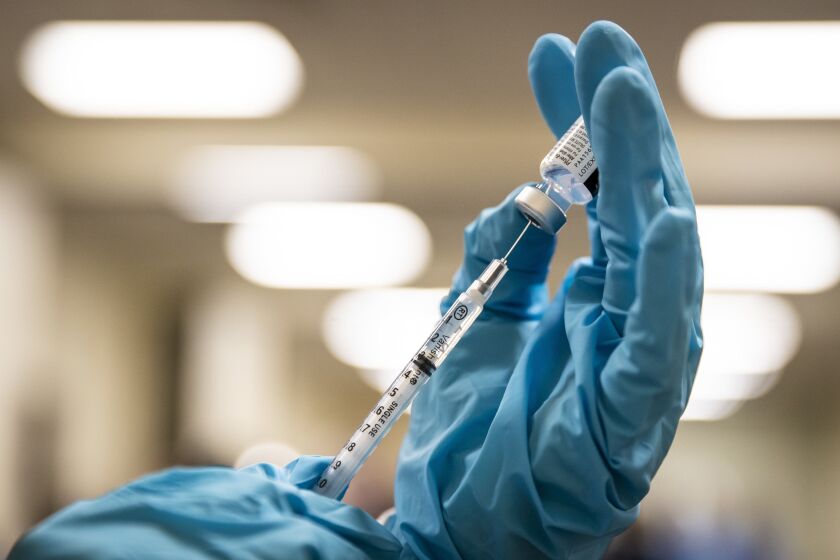Welcome to the Chicago Sun-Times Latin Lockdown Workshop. Please direct your attention to the chalkboard, where I’ve written: “Post hoc ergo propter hoc.”
Let’s say it together and remember to trill your Rs. Ancient Romans called “R” the “littera canina,” or dog letter, for the little growl in it.
“Post hoc, errrgo prrropter hoc.”
Good, good.
In English: “After this, therefore because of this.” It’s what we pointy-heads call a “logical fallacy,” the faulty circuit that connects you to a wrong conclusion when two events occur close together.
I mention it now because the joy of getting millions of vaccines to millions of American arms will be quickly followed by a backlash of imaginary bad results. That isn’t a crystal ball prediction; it’s a take-it-to-the-bank certainty. With the exception of a few extremely rare allergic reactions, the most common vaccine side effect will be passing soreness. But some getting the vaccine will blame it for later being hit by a bus. Post hoc ergo propter hoc.
“With the vaccine, you’ve got to be careful when you hear side effects,” said Dr. Michael Ruchim, a gastroenterologist at Northwestern Medicine well-versed in pharmaceutical trials. “The question arises, ‘Are they cause and effect? Or something random the person getting the vaccine was going to get anyway?’”
On average, 730 Americans per 100,000 die every year. About two a day. So if you give everyone in a random group of 100,000 a teaspoon of water, expect 14 to die over the next week. From heart attacks. Cancer. Hit by buses.
Now give them a vaccine. A week later, another 14 deaths. But in public perception, the vaccine is now deadly. Two people died the very next day! Don’t laugh, this is how the anti-vaxxer movement started. “Timmy got a polio shot, and now he’s autistic!”
Especially since vaccines will be given to seniors first, who are not a random slice of the population but a group already more likely to get sick.
“A 70-year-old gets the vaccine and a week later has a heart attack or a stroke,” Ruchim said. “They’re going to say it was from the vaccine. It wasn’t from the drug. They were going to get that stroke or heart attack if they got a Pez.”
“The biggest example of that is the flu shot,” said Dr. Nancy Glick, an infectious disease specialist at Mount Sinai Hospital. “I can’t tell you how many conversations I’ve had with individuals who say, “I got it, then I got an ear infection.’ I try to explain it wasn’t from the vaccine.”
That’s why test groups are given a placebo during drug trials.
“You’d be shocked by how many times a test patient says, ‘I was on this medication, and it made me fatigued and nauseous and I got headaches,’” Ruchim said. “You check, and it’s, ‘Oh yeah, you were on the placebo.’”
With the vaccines, citing doctors and medical statistics only goes so far with the public.
“They may feel more confident if they hear it from a trusted friend or loved one,” Glick said.
While Tom Hanks thought he was doing a public service by coming out with his COVID diagnosis, what really would have helped Americans, to be blunt, is if he had died from COVID.
“There is this feeling out there that all these people who are famous, politicians or celebrities who got it, did fine with it,” Glick said. “Trump was back working 10 days later. It doesn’t reflect what health care workers know. ... We’ve seen the devastation that people in the community have not seen.”
Folk fallacies are fine, in their place. I wish upon stars. But I don’t credit the mechanism of astral wish fulfillment for Donald Trump’s loss. Get the vaccine. Doctors are up against a vast sea of American ignorance grown swaggeringly proud and defiant through presidential encouragement.
Don’t wait longer than necessary.
“How many parents won’t let their children get a vaccination, saying vaccines cause autism, and the pediatricians are pleading with the parents?” Ruchim said. “This is life or death. People of any age are at risk, but when you get north of 60, with other medical problems — obesity, diabetes, hypertension — COVID is especially deadly. This vaccine, you’ve got to take the faith of the people who study it.
“You can’t screw around. You have to realize, ‘This can kill me while I’m waiting.’”








